8 Best Essential Oils for Eczema Relief
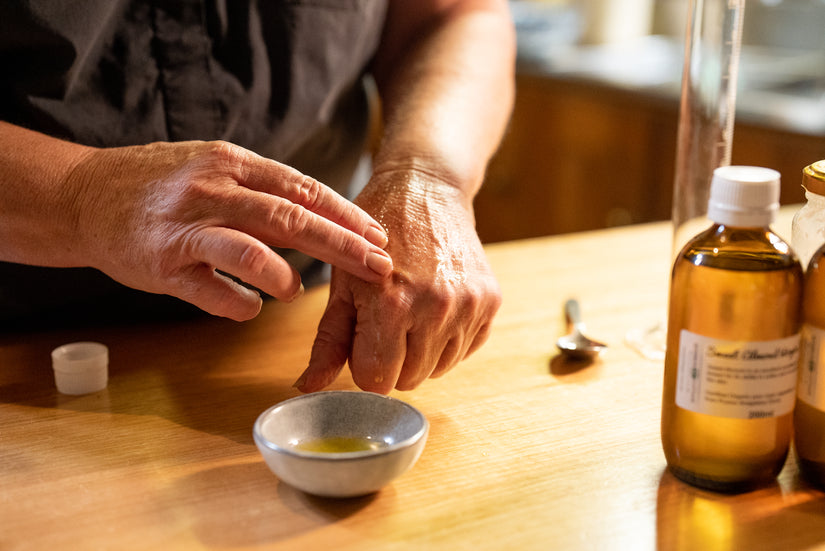
Do you suffer from persistent and uncomfortable eczema? Are you tired of using over-the-counter (OTC) medications that contain harsh chemicals and toxic ingredients? You're not alone, and there's a gentler, more natural approach that may work for you. Essential oils harness the power of plants to treat eczema caused by stress & anxiety, genetics, and environmental triggers. So if you're looking to heal your skin & manage your eczema, these aromatherapy oils may be just what you're looking for.
Essential oils have been used for centuries for their therapeutic properties and are increasingly popular as a natural remedy for improved health. Many essential oils have shown to relieve symptoms of eczema, such dryness, itching, and inflammation. We’re going to cover eight of the best ones, and show you how to use them to manage eczema and chronic dry skin.
How essential oils help treat eczema
Eczema is a chronic skin condition that causes dry, itchy, and inflamed patches of skin. It’s believed to be caused by a combination of genetic and environmental factors, such as stress, environmental irritants, food allergies, and hormonal changes. The root causes & resulting symptoms often result in a lower quality of life: more stress, less sleep, and declining physical & mental health.
The most common treatments for eczema are topical creams and ointments that can contain harsh chemicals. Oftentimes, these medications worsen the symptoms and cause flare-ups to last even longer. But many essential oils have been used to treat a variety of skin conditions for centuries, including eczema. Numerous scientific studies have shown that these oils have anti-inflammatory, antimicrobial, analgesic, and non-comedogenic properties, making them effective pain management options for eczema.
8 essential oils for eczema relief
Lavender oil

Lavender oil’s anti-inflammatory properties help reduce eczema-induced redness, itching, and inflammation. A 2019 study confirmed lavender oil is also an effective treatment for psoriasis, a chronic skin and nail disease that causes rashes. Per the study, topical lavender oil application led to a 73.67% decrease in psoriasis symptoms.
Stress and anxiety are known to trigger eczema. Lavender has a calming effect that can reduce stress and anxiety, resulting in fewer eczema flare-ups.
This oil has antimicrobial properties that prevent infections caused by breaks in the skin. Additionally, you can use lavender essential oil to moisturise dry skin, aiding in recovery and improving overall skin health.
How to Use: Dilute with a carrier oil like coconut oil or natural moisturiser and apply it to affected areas of eczema to reduce inflammation and soothe itching. For full-body relief, add a few drops of a carrier & essential oil mixture to a warm bath to relax and reduce stress.
Tea tree oil

Tea tree oil’s antimicrobial properties help reduce the severity of eczema symptoms. This essential oil’s anti-inflammatory effects combat redness and inflammation from flare-ups. Scratching dry skin can make your eczema symptoms worse. If you feel the need to scratch your skin during a flare-up, use tea tree oil to cool your skin and reduce the urge to itch.
Zinc oxide is a popular eczema treatment. However, according to a 2010 study, “tea tree oil seems to be a more effective anti-eczematic agent than zinc oxide.” This powerful oil can also regulate the skin’s oil production, making your skin feel less dry and irritated.
How to Use: Mix with a carrier oil and apply to eczema patches to reduce inflammation and itchiness. If you prefer to bathe before bed, add a few drops of that same mixture to warm bathwater to soothe your skin.
Chamomile oil
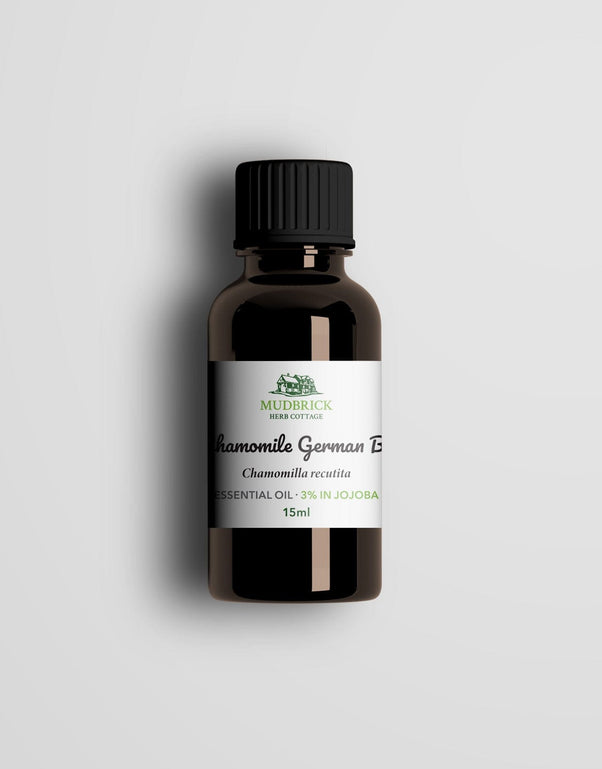
Chamomile oil can reduce stress and anxiety, two common triggers for eczema flare-ups. This oil has soothing anti-inflammatory properties that calm irritated skin and minimise eczema-induced inflammation.
Studies have shown that eczema patients are more susceptible to free radical damage. Antioxidants, such as those found in chamomile, protect the skin from free radicals, preventing further damage. You can mix a carrier oil, such as jojoba oil, with chamomile essential oil to use it topically for free radical protection.
How to Use: Mix it with a carrier oil like almond oil or moisturiser and apply to affected areas to reduce inflammation and itching. Alternatively, add a few drops of a carrier & essential oil mixture to warm bathwater to soothe the skin before bedtime.
Bergamot oil
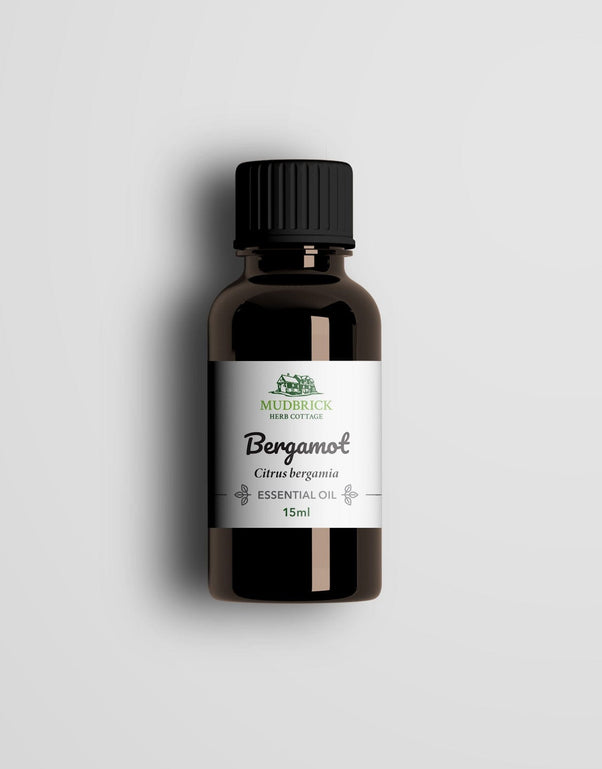
According to the National Eczema Society, eczema damages the uppermost layer of your skin. This damage leaves the skin susceptible to fungal and bacterial infections. During flare-ups, you can apply bergamot essential oil topically to reduce the likelihood of getting an infection; it has antimicrobial properties that fight infection-causing organisms.
Bergamot oil is an analgesic, meaning it relieves pain. It can be used to reduce eczema-induced pain and itching. Bergamot oil’s anti-inflammatory properties can reduce redness and irritation. This oil also calms the mind, lessening stress and anxiety that may lead to eczema flare-ups.
How to Use: Mix bergamot oil with a carrier oil or lotion and apply it to affected patches to relieve itching & inflammation. You can also add the bergamot & carrier oil mixture to warm bathwater to soothe your skin and promote relaxation.
Eucalyptus

Scratching your skin doesn’t stop it from itching, it just prolongs the symptoms. Next time you feel the urge to scratch, mix a carrier oil with eucalyptus essential oil and apply it to your skin. The cooling effect will reduce the urge to scratch, shortening the symptom timeline.
Eucalyptus oil has anti-inflammatory properties that reduce redness, swelling, and irritation caused by eczema. It also helps prevent skin infections and speed up the skin’s healing process after a flare-up.
How to Use: Mix with a carrier oil and apply it to affected areas with your hand. Or add it to warm bathwater to soothe your skin before bed and reduce stress.
Cedarwood
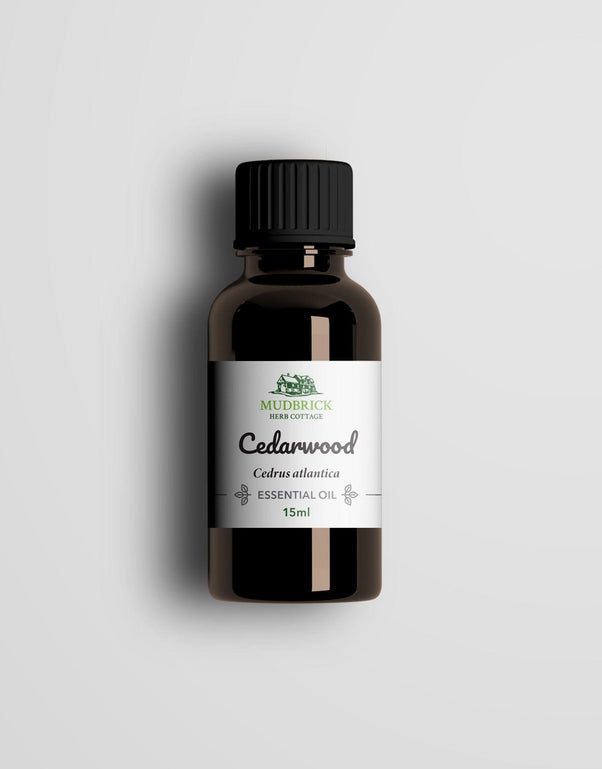
Cedarwood essential oil acts as a natural mood stabiliser, stimulating the release of serotonin to calm anxiety and stress. It can treat the root cause of eczema flare-ups in those with chronic stress or anxiety.
Mix your favourite carrier oil with cedarwood essential oil to make a natural moisturiser that will make your skin look and feel great. According to a 2022 study, cedarwood oil has antioxidant properties, meaning it can protect your skin from free radicals. The same research suggests it has antimicrobial properties, protecting damaged skin from infections.
How to Use: Mix with a carrier oil or lotion and apply it to the inflamed skin. Just like the other oils, you can also add a few drops, along with a carrier oil, to a warm bath for a relaxing, therapeutic soak.
Peppermint

Menthol, the primary constituent of peppermint essential oil, has a cooling effect that can reduce eczema-induced burning sensations. Its anti-inflammatory properties help reduce redness, swelling, and irritation caused by eczema. This oil’s antimicrobial properties can also prevent infections common in people with cracked skin.
How to Use: Dilute a few drops with a carrier oil or your daily moisturiser and apply it to your affected skin.
Patchouli
Patchouli oil has been shown to increase dopamine levels while regulating the production of cortisol, a stress-inducing hormone. This essential oil helps reduce stress and anxiety, leading to fewer eczema flare-ups.
A topical blend of carrier oil and patchouli oil will promote skin cell growth, healing the damage caused by eczema. Patchouli oil’s astringent properties tighten and tone your skin, reducing the appearance of inflammation and irritation.
How to Use: Mix with a carrier oil or your daily moisturiser and apply it to your skin. Or add a few drops to warm bathwater with a carrier oil for a calming, soothing soak.
Other topical oils & skincare creams to alleviate eczema symptoms
Jojoba oil

Jojoba oil is a hypoallergenic carrier oil perfect for people with sensitive skin. It’s a natural, non-comedogenic moisturiser, meaning it doesn’t clog pores. In fact, studies have shown it has anti-acne benefits. Jojoba oil also has antioxidant benefits that protect the skin from free radicals and antimicrobial properties that fight skin infections.
You can use it by itself to treat eczema or combine organic jojoba oil with any of these essential oils to increase its effectiveness.
Calendula and Comfrey Ointment
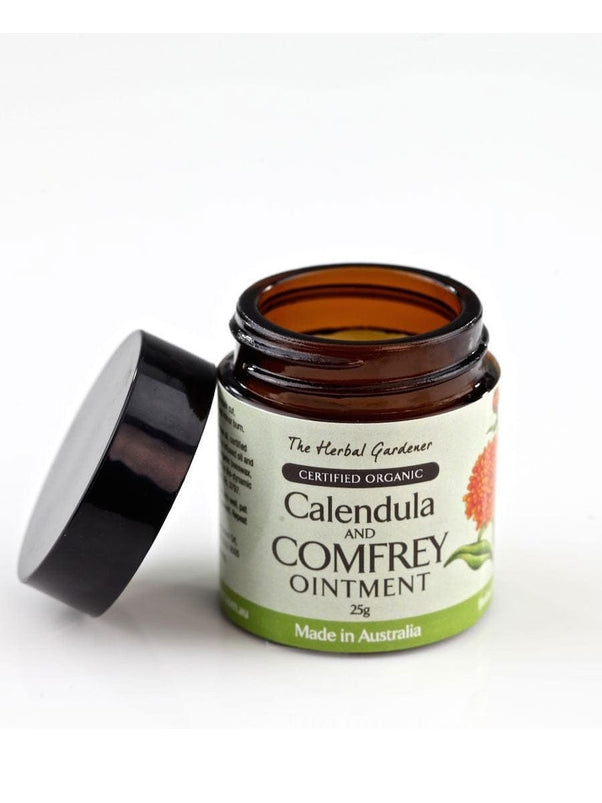
This comprehensive ointment has anti-inflammatory properties, reducing redness, swelling, and irritation associated with eczema. Its wound-healing properties speed up recovery, making Calendula and Comfrey ointment a perfect choice for those with eczema-induced skin damage.
This herbal moisturiser contains comfrey, a healing oil that assists with tissue regeneration, and calendula, a natural dermatological ingredient used in nearly 200 cosmetic formulations.
How to use essential oils to treat eczema
Essential oils are highly-concentrated and may worsen skin irritation if applied directly to your skin. Carrier oils, such as jojoba oil, dilute essential oils and alter their absorption rate, protecting your skin from irritation. Still, everyone reacts differently to essential oils.
Before using essential oils to treat eczema, patch test it on a small area of your skin. Observe the treated area throughout the day to see if you have an adverse reaction. Essential oils can cause irritation if they get in your eyes, mouth, or ears, even when mixed with a carrier oil. And what works for someone else may not work for you, so consider testing multiple oils to see what works for your skin.
For this reason, you must be careful when using them on your face. If possible, avoid using essential oils before physical activity, as your sweat may cause the oil to drip into your eyes or mouth. It’s best to consult a medical professional before using essential oils to treat eczema.
Essential oils offer a natural and holistic approach to treating eczema, an effective approach that will empower you to break free from the constant symptoms. However, it’s important to remember that they are not a cure for eczema, only a symptom-management tool to improve your lifestyle. They’re most effective when combined with positive lifestyle changes, stress management, and a healthy diet.



